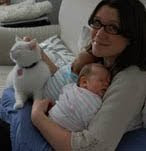I am live-blogging from the slightly more intimate Room 2 at Cybermummy, where the session SEO (Search Engine Optimisation) & Blog-to-Book Cyberlabs is about to begin. As the title of the session suggests, it's divided into two parts...
Part I: SEO Basics and Twitter tips with social media expert Charlotte Smith, AKA Madame Blogger, from Glam Media.
Part II: Blog to book - tips for writing your book from the rather dashing Robin Harvie from Harper Collins, who'll be giving you the lowdown on how to turn your blog into a bestseller.
Part 1: SEO (Search Engine Optimisation) Basics and Twitter Tips, by Charlotte Smith
SEO BASICS:
Why is knowing how to write for the internet important? It helps you raise your rankings and to reach your audience. You want people to read your blog.
There are two types of searches. When you search on Google, the top two searches are 'paid searches' - the companies have bought the space at the top of the page. The other, 'organic search' is ours. We're blogging for our passion, and the 'organic search' is how we find each other.
SEO is kind of like creative writing, but there are some essential tools - firebox browser, google toolbar, SEO quake or SEO book toolbar.
Your ranking is important - you want to be on the first top ten hits on google. 93% of users won't go past the first page, and less than 1% goes beyond the second page of a search.
A search engine crawls the web like a spider [Charlotte was very proud of this analogy!] to bring up all the pages talking about 'spiders' for example. What is your content? What is it relevant too? You want to be indexed - so take whatever you're talking about put it in your URL. Search engines index the phrases they find on each webpage into a database, so you need to be aware of this and use it to bring people into your site.
Whatever you're writing about - think about how your friends would search for it? How would your mum search for it, and then make sure you write accordingly. It's about relevancy and how it appears on your page.
KEYWORDS - Content is King. You need to learn to write for search engines. Identify exactly what the article or page is about and understand how your target market searches for information. What search terms would they use? Use the search tool to identify the best keywords to target for the article or page. A simple change from eg. 'weight loss tricks' to 'weight loss tips' can massively increase your search ranking.
Google analytics can give you the keywords for your site. What keywords are your readers using? You can then use them in your posts. Density, frequency, prominence, proximity, semantic reinforcement - remember this is how search engines are looking at your keywords.
Create a database of the keywords relevant to your site. This ensures you won't forget them so get an Excel spreadsheet set up of them
Link to each other. This is really important. If you don't have time to write a post for your blog but one of your friends might have blogged about something you're interested in, take 50 words of their post and link back to their original post instead. Hopefully they might return the favour sometime, so you're opening up their audience to your audience and vice versa.
What questions are your community asking? Can you give them information that they can't find anyone else? Always be thinking about how someone would search for this information.
TWITTER TIPS:
Tweetdeck is awesome, especially if you have more than one account. Engage with each other. Do #followfriday. You should be all about growing your community.
When Charlotte first started using Twitter she just pimped out her blog posts, but got little traffic back. It wasn't until she started talking to, and engaging with, other users that her tweets became more successful in driving traffic to her blog. If you're got an identity, people are more likely to click through to your blog posts. It's all about ENGAGEMENT.
Use Twitter for buzz marketing - if you've got a giveaway, new site design, competition ... TWEET IT!
Charlotte locks her tweets. She followed you, she wants you to follow her back. And if you don't follow back, why should you read her tweets? She doesn't want everyone to see what she's saying all of the time. So she's selective.
#Cybermummy is today's hashtag. Get tweet pics going.
QUICK SUMMARY:
SEO - how to get your name out there and think about your keywords to come up in a search. What's a metatag? It's a description of your site - you want this to come up in the search. Put metatags in the back of your CSS.
Keyword research:
Identify keyword groups
Brain storm
Keyword research tools (Google Keyword Tool, Wordtracker)
Keep a list of keywords for your site
Think about how you search
Don't over-use keywords because you don't want to spam it. Google will pick up on this. You should be using ideally no more than two to three keywords per page.
Areas to optimise with keywords:
Title tag
H1 tag (the heading of the page)
The anchor text
In the first 25 words of text on the page
Meta description - keep it short, no more than 152 characters (including spaces). Make it relevant!
Charlotte's session has finished, so now it's Robin's turn to take to the stand...
Part II Blog-to-Book, with Robin Harvie
You as writers need to come up with a package, including the network you've tapped into. The more you can do that, the more attention you'll get from publishers.
Content:
You all write, you all have stories to tell. A publisher gets up to 30 manuscripts landing on their desk every day. Only the top two will even be considered by the publisher. You have to convert from a blog to the wider world. The bottom line is what dictates what gets published - from 10s to 100s to 1000s of copies sold all over the world.
There's divided opinion about what people want in books from blogs. One big narrative with beginning, middle and end or diary entries? Should you blend truth and fiction for the sake of a narrative and a good story? The publisher will be part of the process for writing the book but the germ of the idea has to come from you.
The package:
Do you tweet? How many followers? Are you on Facebook? How much social media presence do you have? All questions a publisher will ask immediately. You need thousands of people logging onto your blog at least every week. How do you convert that into copies? You need to come with a readymade audience.
An area now being looked at in more depth is the future of publishing. What is digital publishing? What will it look like in the future? What wil the job as a writer be in the future? An author is a curator of content. Look at your content as more than the written form - what can you give as a consumer experience, including videos, downloads, engaging directly with your readers. Convert the blog into an e-book format. The value of text itself has diminished. It's much more of a multi-media idea.
Amazon believe we don't need publishers anymore. If you've got your market, you've got your audience. You've got a savvy idea. you've got your twitter followers. All you need is a distributor. Why would you give 15% to a publisher? So instead, you go direct to Amazon for a digitally-formatted book and circumvent the straight-to-print format. The old process is gone. Amazon will offer you a much better royalty share and they're there for you if you're brave enough. Unless you want to see yourself in print - and then publishers can create printed books for you. Other than that, you're in charge.
QUESTIONS FOR ROBIN:
What happens about doubling up content from blog to the book (repeated content)?
With some published blog authors, all their content is there online. What do you do with free content when it comes to promoting your book? Should you take free content down from the blog? We published a book, sold no copies. Then we put the whole book online for free and sold thousands of copies. Fight hard if a publisher demands you take the content down from your blog.
How do you get the blog to the publisher?
You can sit in your room and wait for people to come and find you. But you need a huge following and to be aggressive in getting yourself noticed. Use social media. If you have good content people will follow you and find you. You're doing the groundwork putting your material out there.
What is issuu.com?
It's a free library service where you can upload any material you want. You can choose who sees it or leave it open to the general public and you can send the link around.
Do publishers actively seek blogs?
Yes is the answer. They are looking, all the time. But there are masses of blogs out there, it's enormous. You've got to recognise the reality - publishers are publishing half as many books as they were two years ago. They're more cautious, they don't just take a punt anymore, there's a much more scientific approach. You've got to work hard on the content and the social media stuff to get noticed.
Is the parent blogging world a recognised trend? Is it considered a viable publishing avenue? Do they garner lots of market interest?
The ones that work, really work. but they're few and far between. But the same applies to novels, memoirs. There may be a slight fatigue on the back of those that have been so successful. There is success out there, but you need to make your idea sing. It's not a niche market, there are opportunities to be had.
What marketing support can you expect from a publisher?
The onus is on the author - you come up with the marketing ideas. The old-fashioned way of buying a book, sticking up posters, doing a tour, and siting back, crossing your fingers has gone by-the-by largely (due to recession). Print advertising isn't as powerful as people think it is. The online marketing is time-consuming but it's free and much more effective.
How much do you need to put together to send to a publisher? A synopsis, a chapter, the whole thing?
Fiction - you've got to write the whole thing. Get it tip-top before sending. Spend lots of time on it. It's got to be the best it can possibly be.
Are the only mum blogs that can be successful published as a book those by celebrities? No-one wants to read about everyday mums?
The celebrity publishing market has gone through the floor. It's failing. If your blog is good enough it will find a publisher.
Everyone had lots of questions for Robin, but unfortunately we ran out of time. I hope you enjoyed this session at Cybermummy, I know I did and it's given me lots to think about.










